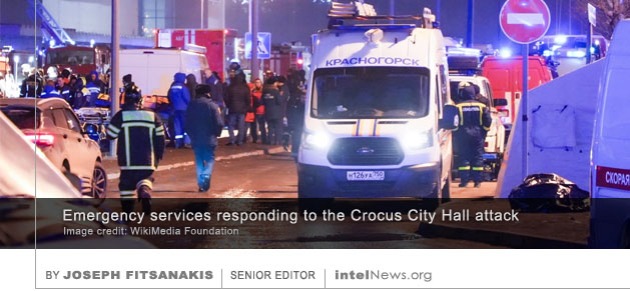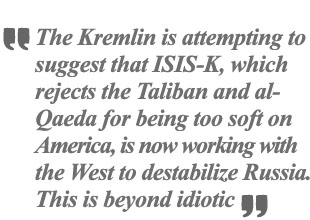Opinion: Fumbling Russian spies fail to stop ISIS-K attack, despite warnings from U.S.
March 25, 2024 7 Comments
 NO COUNTRY HAS BETTER intelligence on the Islamic State-Khorasan Province (known as ISIS-K) than the United States. American forces have faced ISIS-K almost from the moment the group was founded in 2015 in Pakistan, just a few miles from the Afghan border. It was there that a group of disaffected members of the Tehreek-e-Taliban-e-Pakistan (TTP, commonly referred to as the Pakistani Taliban) began turning their backs on al-Qaeda, which they saw as a failing brand, and joined the Islamic State of Iraq and Syria (ISIS).
NO COUNTRY HAS BETTER intelligence on the Islamic State-Khorasan Province (known as ISIS-K) than the United States. American forces have faced ISIS-K almost from the moment the group was founded in 2015 in Pakistan, just a few miles from the Afghan border. It was there that a group of disaffected members of the Tehreek-e-Taliban-e-Pakistan (TTP, commonly referred to as the Pakistani Taliban) began turning their backs on al-Qaeda, which they saw as a failing brand, and joined the Islamic State of Iraq and Syria (ISIS).
By 2017, ISIS-K had begun to draw to its ranks hundreds of fighters from central and south Asia, who were inspired by the group’s goal of establishing an Islamic caliphate in the lands of the greater Khorasan. The term refers to a historical region that extends from eastern Iran and Turkmenistan, to the mountains of Kyrgyzstan, containing all of present-day Afghanistan, most of Uzbekistan, and even some parts of the Russian Caucasus. Like the Islamic State of Iraq and Syria (ISIS) during its heyday, ISIS-K aspires to establish control over a territorially unified entity and then use perpetual war to expand its influence in central Asia and beyond.
Until 2021, the biggest obstacle to ISIS-K’s plan for regional domination was the U.S. By some accounts, American forces and Western-trained Afghan commando units had managed to eliminate more than half of ISIS-K’s 4,000-strong base in northeastern Afghanistan. Since the hurried U.S. withdrawal from the country in 2021 (which was marred by an ISIS-K suicide bombing that killed nearly 200 people, including 13 U.S. troops), ISIS-K has expanded its reach beyond all prior measure. The group has since claimed responsibility for attacks in Afghanistan, Pakistan, Iran, and now Russia, that have killed over 600 people and injured thousands.
A primary reason for the proliferation of ISIS-K’s terrorist activity is that the U.S., which has more intelligence than anyone on the group, issues warnings that are  not being taken into consideration by the group’s primary targets, namely Afghanistan, Iran, and Russia. Indeed, despite the Washington’s best efforts, its warnings about pending ISIS-K attacks have been ignored by the group’s primary targets. A few days after an ISIS-K attack killed nearly 100 people in Kerman, Iran, The Wall Street Journal claimed the U.S. government had provided Tehran with “a private warning” of an imminent terrorist threat from ISIS-K. If that is true, then the Iranians clearly did not heed Washington’s warning.
not being taken into consideration by the group’s primary targets, namely Afghanistan, Iran, and Russia. Indeed, despite the Washington’s best efforts, its warnings about pending ISIS-K attacks have been ignored by the group’s primary targets. A few days after an ISIS-K attack killed nearly 100 people in Kerman, Iran, The Wall Street Journal claimed the U.S. government had provided Tehran with “a private warning” of an imminent terrorist threat from ISIS-K. If that is true, then the Iranians clearly did not heed Washington’s warning.
It now appears that, once again, Washington had considerable intelligence insight into ISIS-K’s plans to strike inside Russia. On March 7, the U.S. embassy in Russia warned on its website that “extremists have imminent plans to target large gatherings in Moscow, to include concerts”. The warning provided no specifics. However, seeing how U.S. authorities issued private warnings to Iran, a country with which the U.S. has no diplomatic relations, then it is highly likely they provided similar information to Russia, which at least hosts American diplomats and intelligence officers on its soil. Yet, not only did the Russians ignore these warnings, but they openly dismissed them.
Three days before the fatal attack on the Crocus City Hall in the city of Krasnogorsk, Russian President Vladimir Putin publicly stated that the U.S. warning “resembled outright blackmail and the intention to intimidate and destabilize [Russian] society”. Some reports in Western media translated Putin’s use of the Russian term “provokatsiya” as “provocation”. But that translation is not precise; provokatsiya refers to a deliberate ruse, designed or promoted by an intelligence service, in order to achieve a predetermined political goal. Putin went on to say that Russian intelligence should focus on the “terrorist” tactics of Ukraine on Russian soil.
The fumbling Russian leader is now trying to cover his resounding security failure, as well as the failure of his intelligence services, by insinuating that the Tajik terrorists behind the Crocus City Hall attack were somehow connected to Ukraine. For the record, ISIS-K, which claimed responsibility for the attack, has condemned the Afghan Taliban as “Western puppets” and routinely refers to al-Qaeda as “apostates” (traitors). The Kremlin is attempting to suggest that this  militant Sunni group, which rejects the Taliban and al-Qaeda for being too soft on America, is now working with American ally Ukraine in order to destabilize Russia. This claim is beyond idiotic.
militant Sunni group, which rejects the Taliban and al-Qaeda for being too soft on America, is now working with American ally Ukraine in order to destabilize Russia. This claim is beyond idiotic.
Instead of concocting inane fairytales about an imaginary alliance between the West and the Islamic State, the Russian leadership should seriously examine the sorry state of its intelligence services and their leaders. These are the same intelligence leaders who assured the Kremlin in 2022 that the so-called “special military operation” in Ukraine would be a picnic in the park. They also appeared to believe that the attack on Ukraine would weaken the North Atlantic Treaty Organization (NATO), when in fact it has done the exact opposite. They are now once again failing miserably to carry out their mission, which is to protect the Russian people from harm. Ironically, to achieve that mission, Russian intelligence agencies must learn to rely more on their American rivals.
► Author: Joseph Fitsanakis | Date: 25 March 2024 | Permalink







Perhaps ordinarily China, the US and Russia share some counter-terrorism intelligence through back-channels in the shape of the declared Heads of Station sharing with host nation security services.
But clearly US-Russian intel relations are not good – another casualty of Putin’s invasion of Ukraine.
I compare Putin’s failure to take appropriate action with ISIS-K to Stalin’s failure when warned repeatedly the Germans were going to invade.
Add that to Putin’s adoration of Stalin and history repeats. Again.
Perhaps the Russian’s look at ISIS-K’s lack of targeting of US and western peoples as a sign that they’re in cahoots?
Look at wikileaks. For years they leaked heavily against the US whilst refusing to leak material they had been given by whistleblowers on the Russian state.
Look I personally don’t believe that ISIS-K works in league with the West however appearances seem to drive intelligence assessments as much as evidence does.
To Anonymous (your March 25, 2024 at 19:20 )
Where you comment “Look I personally don’t believe that ISIS-K works in league with the West however appearances seem to drive intelligence assessments as much as evidence does.”
Congratulations for spreading ultimately Russia-serving uncertainty and doubt.
One has to wonder if duty to warn is even an effective tradition that can be upheld when good faith is not reciprocated. My going theory is that Russian Analysis doubted the ability of Isis K to effectively attack anything, given it’s decentralized structure and loss of funding. So they had to basically debate between the validity of their own analysis and the immediacy that the United States was implying to the threat. Given the bad faith that exists between the two states, the ongoing dedication of resources to other areas and the inherent bias against warning intelligence whenever an assessment that counters the prevailing narrative comes around , it was almost bound to happen. Especially given the increased workload of the FSB and decreasing capabilities of the SVR.
This post is not netral, USA has done sinilar things as Russia invading Ukraine. The invasion of Ukraine by Russia was not fair, nor was the invasion of Vietnam that US thankfully lost. USA should get off its high horse.
This incident highlights the challenges of intelligence sharing and cooperation between different countries’ intelligence agencies. Despite efforts to work together to combat terrorism and prevent attacks, sometimes critical information may not be acted upon in a timely manner or effectively enough to prevent a tragic event like this one.
It also raises questions about the effectiveness and reliability of intelligence gathering and analysis in the fight against terrorism. As we continue to grapple with the threat of extremist groups like ISIS-K, it is crucial that countries around the world work together closely and efficiently to share information and prevent future attacks.